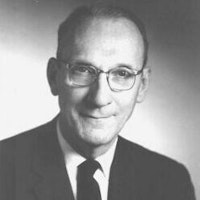Spirit Is of the Essence
Topic: Justice, Vision, & Leadership
We simply are not giving the maturing help to young people that is well within our means to do. Instead, we are acting on the principle that knowledge, not the spirit, is power. Knowledge is but a tool. The spirit is of the essence.
Robert K. Greenleaf (1904–1990) was the founder of the modern Servant leadership movement and the Greenleaf Center for Servant Leadership.
Robert K. Greenleaf was born on September 14, 1904, in Terre Haute, Indiana, a time marked by industrial growth and societal shifts. His upbringing in the Midwest instilled a community-oriented outlook, shaping his future ideologies on leadership and management. Greenleaf's education at Carleton College, where he studied mathematics and physics, honed his analytical abilities and sparked his interest in leadership ethics and societal structures, foreshadowing his contributions to organizational leadership.
In his career at AT&T, Greenleaf observed the limitations of traditional leadership models, particularly the neglect of individual growth within organizations. His interactions with notable figures like Rabbi Abraham Heschel and Norman Vincent Peale deepened his understanding of leadership. Greenleaf's diverse interests, including music and photography, enriched his perspective on creativity and leadership. These experiences laid the foundation for his servant-leadership theory, which posits effective leaders as those who serve the needs of their teams and communities first.
Greenleaf's 1970 essay "The Servant as Leader" introduced the revolutionary concept of servant-leadership, advocating for leaders who prioritize their team's welfare. This philosophy, derived from his professional observations and personal reflections, addresses leadership's role in nurturing younger generations and the broader society. Greenleaf's writings, focusing on integrity and individual action, underscore the importance of spiritual and moral development in leadership. His legacy, influencing various sectors, continues to champion the spirit over knowledge as the true source of power, urging for visionary leadership that remains pertinent today.
Servant Leadership
Greenleaf, Robert K. The Power of Servant Leadership: a Series of Addresses and a Personal Testimony. Berrett-Koehler Publishers, 1998, [Robert K. Greenleaf, The Power of Servant-Leadership, Vision for Our Times: Where Is It?]

Robert K. Greenleaf
Theme: Servant Leadership


About This Robert K. Greenleaf Quotation [Commentary]
Robert K. Greenleaf’s statement, “Knowledge is but a tool. The spirit is of the essence,” invites us to reassess the balance between knowledge and the human spirit in leadership. This perspective highlights a crucial aspect often overlooked: the development of spirit, which encompasses empathy, vision, and integrity, is paramount. It prompts a reflection on our approach to leadership and the nurturing of young people, suggesting that the essence of true leadership lies not merely in accumulating knowledge but in fostering the qualities of the human spirit.
Greenleaf expresses a critical concern for the younger generation, pointing out a societal shortfall in providing spiritual and moral guidance. His observation that we fail to offer “maturing help” to young people highlights a broader issue of neglect. This is a reminder for leaders to cultivate environments that prioritize the growth of a spirit characterized by service, compassion, and visionary thinking. Greenleaf argues that the real power in leadership comes from our ability to connect, inspire, and lead with a spirit of authenticity and purpose.
Furthermore, Greenleaf touches on the significance of vision in leadership, emphasizing its current scarcity. Referencing “Where there is no vision, the people perish,” he stresses the importance of a spirit-led leadership approach. Such an approach advocates for the comprehensive development of individuals, aiming to equip them for positive societal contributions. Greenleaf’s call for visionary leadership underscores the need to inspire action and decisions with a spirit that goes beyond intellectual achievements, highlighting the foundational role of spirit in effective leadership.
Robert K. Greenleaf, The Servant As Leader (Excerpt)
Greenleaf’s seminal essay The Servant as Leader was published in 1970. In it, he proposed that the best leaders were servants first, and the key tools for a servant-leader included listening, persuasion, access to intuition and foresight, use of language, and pragmatic measurements of outcomes. In the next four years, two more essays explored ideas that an entire institution—and a society—could act as servant, and that trustees should act as servants. In 1976, Paulist Press published Servant Leadership, a book that combined these and other essays. Greenleaf always claimed that although he was informed by the Judeo-Christian ethic (he became a Quaker in mid-life), servant leadership was for people of all faiths and all institutions, secular and religious. He knew that he was not a perfect servant-leader, but it was his ideal, and the arc of his life bent in that direction.
Along the way, Bob and Esther made friends with luminaries of their day like Rabbi Abraham Heschel, Norman Vincent Peale, Peter Drucker, Jungian analyst Ira Progoff , semanticist Alfred Korzybski, and hundreds of others. Bob loved to sing bass, attend lectures and concerts, play the recorder, read, fly giant kites, and take and develop pictures. His work and writings continue to have an impact on fields as diverse as systems thinking, management, leadership, organizational development, religion, assessment and evaluation, and a baker’s dozen other disciplines. Greenleaf, however, did not describe himself a philosopher, academic, theologian or writer, but as a businessman and a seeker. He died in 1990 and is buried in Terre Haute, Indiana, with an epitaph that shows his wit: “Potentially a good plumber; ruined by a sophisticated education.”
–Don M. Frick [The biographer of Robert K. Greenleaf].
Vision for Our Times: Where Is It? [Excerpt from Robert K. Greenleaf’s The Power of Servant-Leadership]
Additional Robert K. Greenleaf Quotes
Resources
Related Quotes
Copyright © 2017 – 2026 LuminaryQuotes.com About Us